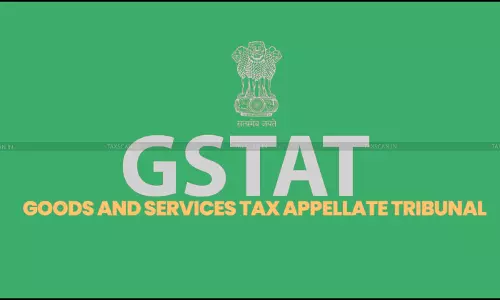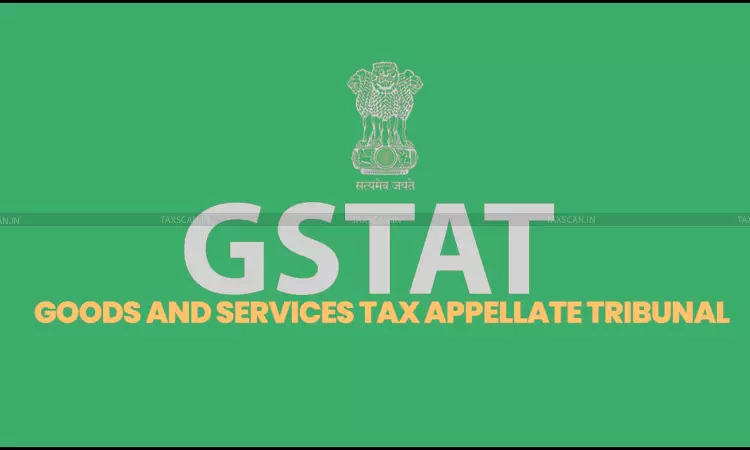Begin typing your search above and press return to search.

Wai Wai Noodles Maker Found Guilty Of Profiteering ₹90.9 Lakh By Holding GST Rate Cut Benefit from Customers: GSTAT
The Goods and Services Tax Appellate Tribunal (GSTAT), Delhi, has upheld findings of profiteering against instant noodle manufacturer C.G. Foods,...






![Budget 2026: Five-Year Tax Break for NRI Supplying Capital Goods to Small Manufacturers [Read Finance Bill 2026] Budget 2026: Five-Year Tax Break for NRI Supplying Capital Goods to Small Manufacturers [Read Finance Bill 2026]](https://images.taxscan.in/h-upload/2026/02/01/500x300_2122896-union-budget-2026-budget-scan-2026-tax-break-non-resident-tax-capital-good-small-manufacturers-taxscan.webp)







![Seizure and Retention of Documentary Records and CPU prevented from Contesting GST Demand: Calcutta HC Directs Return of Items [Read Order] Seizure and Retention of Documentary Records and CPU prevented from Contesting GST Demand: Calcutta HC Directs Return of Items [Read Order]](https://images.taxscan.in/h-upload/2026/02/06/500x300_2124046-seizure-retention-documentary-records-cpu-prevented-contesting-gst-demand.webp)

![Service Tax Exemption Limited to PGP and not to PGPPM, PGPEM, and EPGP Courses: SC Dismisses Revenue’s Delayed Appeal Against IIM [Read Order] Service Tax Exemption Limited to PGP and not to PGPPM, PGPEM, and EPGP Courses: SC Dismisses Revenue’s Delayed Appeal Against IIM [Read Order]](https://images.taxscan.in/h-upload/2026/01/29/750x450_2122439-service-tax-exemption-limited-to-pgp-and-not-to-pgppm-pgpem-and-epgp-courses-sc-dismisses-revenues-delayed-appeal-against-iim-taxscan.webp)
![CESTAT allows Service Tax Refund for Nokia, Denial on Rent-a-Cab, Outdoor Catering & Security Services Set Aside [Read Order] CESTAT allows Service Tax Refund for Nokia, Denial on Rent-a-Cab, Outdoor Catering & Security Services Set Aside [Read Order]](https://images.taxscan.in/h-upload/2026/01/27/500x300_2122002-service-tax-refund-nokia-taxscan.webp)
![VAT paid on Sale of Copyright of ‘Kolangal’ Dubbed Serials: CESTAT Quashes Service Tax Demand on Ananda Vikatan [Read Order] VAT paid on Sale of Copyright of ‘Kolangal’ Dubbed Serials: CESTAT Quashes Service Tax Demand on Ananda Vikatan [Read Order]](https://images.taxscan.in/h-upload/2026/01/26/500x300_2121966-vat-kolangal-dubbed-serials-cestat-service-tax-demand-ananda-vikatan-taxscan.webp)
![Service Tax Exemption for Non-Commercial Govt Buildings: CESTAT Remands Matter for Fresh Verification of Documents Under Notification [Read Order] Service Tax Exemption for Non-Commercial Govt Buildings: CESTAT Remands Matter for Fresh Verification of Documents Under Notification [Read Order]](https://images.taxscan.in/h-upload/2026/01/26/500x300_2121968-service-tax-exemption-non-commercial-govt-buildings-cestat-remands-fresh-verification-documents-under-notification-taxscan.webp)
![Bona Fide Belief Bars Extended Limitation u/s 73: CESTAT Quashes ₹3.72 Lakh Service Tax Demand [Read Order] Bona Fide Belief Bars Extended Limitation u/s 73: CESTAT Quashes ₹3.72 Lakh Service Tax Demand [Read Order]](https://images.taxscan.in/h-upload/2026/01/24/500x300_2121756-bona-fide-belief-service-tax-taxscan.webp)
![FinMin Revises Customs Tariff Values for Gold and Silver [Read Notification] FinMin Revises Customs Tariff Values for Gold and Silver [Read Notification]](https://images.taxscan.in/h-upload/2026/02/06/750x450_2123968-finmin-revises-customs-tariff-values-gold-silver-taxscan.webp)


 Kavi Priya
Kavi Priya
![Service Tax Not Payable on liquidated damages collected from supplier on account of non-performance of the contracts: CESTAT [Read Order] Service Tax Not Payable on liquidated damages collected from supplier on account of non-performance of the contracts: CESTAT [Read Order]](https://www.taxscan.in/wp-content/uploads/2024/12/CESTAT-CESTAT-Bangalore-Service-Tax-liquidated-damages-Taxscan.jpg)
 Yogitha S. Yogesh
Yogitha S. Yogesh
 Rupesh Sharma
Rupesh Sharma


 Saagarika Gopinath
Saagarika Gopinath

![Delhi HC Refuses to Interfere With Validity of CBIC Circular on “Proper Officer” Powers Under CGST Act [Read Order] Delhi HC Refuses to Interfere With Validity of CBIC Circular on “Proper Officer” Powers Under CGST Act [Read Order]](https://images.taxscan.in/h-upload/2026/02/07/500x300_2124156-delhi-hc-refuses-to-interfere-with-validity-of-cbic-circular-on-proper-officer-powers-under-cgst-act.webp)
![Temporary Holding of Spare Parts by Service Engineers Not ‘Place Of Business’ or ‘Fixed Establishment’: AAAR [Read Order] Temporary Holding of Spare Parts by Service Engineers Not ‘Place Of Business’ or ‘Fixed Establishment’: AAAR [Read Order]](https://images.taxscan.in/h-upload/2026/02/07/500x300_2124143-service-engineersjpg-1.webp)
![Repair Services Via Field Engineers in State Don’t Create ‘Place of Business’ When Contracts & Invoicing from HO: AAAR [Read Order] Repair Services Via Field Engineers in State Don’t Create ‘Place of Business’ When Contracts & Invoicing from HO: AAAR [Read Order]](https://images.taxscan.in/h-upload/2026/02/07/500x300_2124122-repair-services-via-field-engineers-in-state-dont-create-place-of-business-when-contracts-invoicing-from-hojpg.webp)




